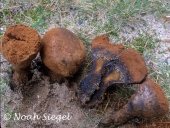I see two reasons for the high prices of education.
First, it makes a revenue for the people doing the teaching. If you know you are going to teach only 30 people, why not to start with the 30 people that can pay the most? If there are vacant student chairs, they will price it down, or stop teaching if it becomes too low.
Second, it reduces the number of experts, so the graduate students can offer their expertise at higher prices, allowing them to make a life.
But, as OP said, there's no need for certifications if you are going to do this in your own property. Also, the food school web gives lots of free webinars where you can learn the basics, and I think it's
enough for most applications. If you are a busy farmer, however, you might not want to spend your free time learning about all that stuff, and might prefer to pay someone else to do the counseling.
I've watched several of their webinars. Their methodology is quite simple.
- Use a composting recipe according to the desired crops. More woody crops require more woody materials in the
compost pile.
- Make a really good compost, controlling heat (60 to 70 ºC), mixing (turning the borders to the core of the pile), humidity (~50%), ingredients (
local and diverse materials, free of toxics, chopped), ... that is biologically active and aerobic. It should smell like forest and be brownish. Optionally, feed worms with the finished compost for better results, using worm castings instead of compost.
- Apply compost extracts or compost teas on the fields. Tea is easier, but gives smaller quantities.
- Use a microscope for checking the life in your soil and the quality of the compost, since you don't want to apply a compost that is of less quality than what's already in your soil.
I'd say you can skip the microscope part if you are just
gardening, since it's much easier to track results.

 3
3




 2
2




 1
1




 3
3
















